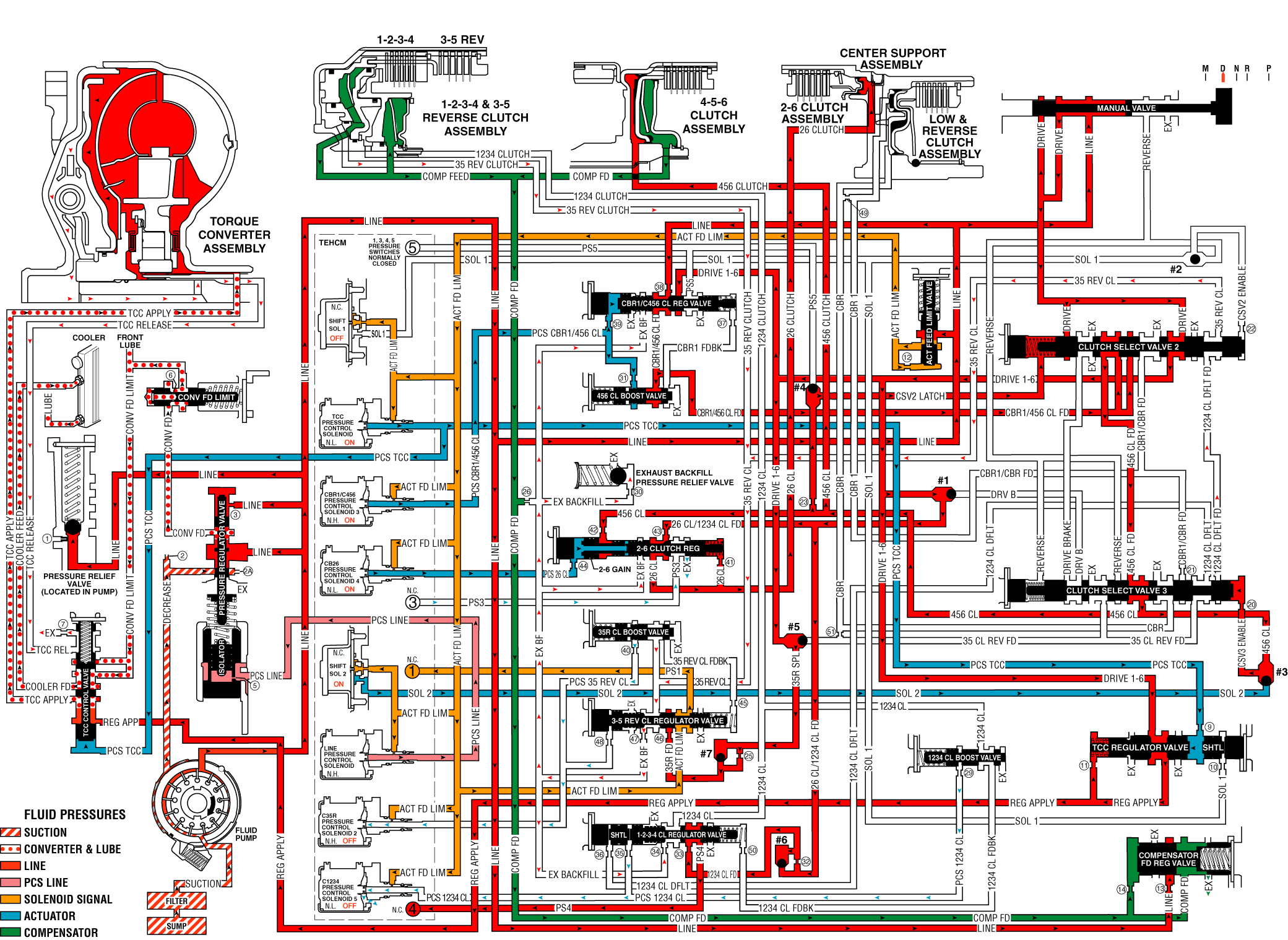As the vehicle speed increases, the transmission control module (TCM) receives input signals from the automatic transmission input and output speed sensors, the throttle position sensor and other vehicle sensors to determine the precise moment to command ON the normally-low CB2-6 pressure control solenoid 4 (PCS). At the same time the normally-high C3-5R pressure control solenoid 2 is commanded OFF.
2-6 Clutch Applies
CB26 Pressure Control Solenoid 4
The CB2-6 pressure control solenoid 4 is commanded ON, allowing actuator feed fluid to enter the PCS 2-6 clutch fluid circuit. PCS 2-6 fluid is routed through orifice #44 and then to the 2-6 clutch regulator gain valve.
2-6 Clutch Regulator Gain Valve
The 2-6 clutch regulator gain valve allows the gain (valve input to output pressure magnification factor) of the 2-6 clutch regulator valve to be different for a 1-2 shift verses a 5-6 shift. For a 5-6 shift PCS 2-6 clutch fluid pressure passes through the hollow valve and only acts on the 2-6 regulator valve area, resulting in the "low gain" pressure output.
2-6 Clutch Regulator Valve
PCS 2-6 clutch fluid moves the 2-6 clutch regulator/gain valve assembly against the 2-6 clutch regulator valve spring force to allow 2-6 clutch/1-2-3-4 clutch feed fluid to pass through the valve. The 2-6 clutch/1-2-3-4 clutch feed fluid is routed into the 2-6 clutch fluid circuit where it passes through orifice #41 and then to the spring end of the 2-6 clutch regulator valve, and to the 2-6 clutch within the center support.
2-6 Clutch
The 2-6 clutch fluid from the 2-6 clutch regulator valve is routed through the center support and to the 2-6 clutch piston assembly. The 2-6 clutch fluid pressure moves the piston against 2-6 clutch spring force to apply the 2-6 clutch plates.
3-5 Clutch Releases
C35R Pressure Control Solenoid 2
The C3-5R pressure control solenoid 2 is commanded OFF, allowing PCS 3-5 reverse clutch fluid from the 3-5 reverse clutch boost valve and the 3-5 reverse clutch regulator valve to exhaust through the solenoid.
3-5 Reverse Clutch Boost Valve
The 3-5 reverse boost valve spring force moves the valve to allow 3-5 reverse clutch feedback fluid from the 3-5 reverse clutch regulator valve to enter the 3-5 reverse clutch circuit and exhaust.
3-5 Reverse Clutch Regulator Valve
The 3-5 reverse clutch regulator valve spring force moves the valve to allow 3-5 reverse clutch fluid from the 3-5 reverse clutch to pass through the valve and enter the exhaust backfill fluid circuit. The 3-5 reverse clutch fluid then enters the exhaust backfill fluid circuit and is routed through orifice #30 to the exhaust backfill pressure relief valve where excess pressure is exhausted.
3-5 Reverse Clutch
The 3-5 reverse clutch spring force combined with force from the compensator move the 3-5 reverse clutch piston to release the 3-5 clutch plates and forces 3-5 reverse clutch fluid to exhaust from 1-2-3-4 and 3-5 reverse clutch housing. The 3-5 reverse clutch fluid is then routed to the 3-5 reverse clutch regulator valve where it enters the exhaust backfill circuit.
Drive Range, Sixth Gear

